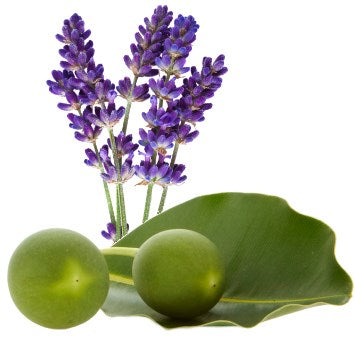Buying Guide for Natural Skin Care - Specific Concerns

In this section of the guide we walk you through what to look for to address specific skin concerns. In case this does not suit you at this time, you can go back to the top of the guide.
You can scroll to read through this section completely, or click one of the following links to skip forward to a particular area.
Highly reactive or sensitive skin

Characteristics: Your skin reacts to many products and while many people are looking for anti-aging products and other skin enhancers, you work hard to find a product that does not cause you to break out. Take heart because natural skincare has a multitude of ingredients you can look for that can help you get clear skin.
Start with gentle cleansers that do not contain soap. Soap is generally abrasive and depletes skin’s natural oils, forcing your already sensitive skin to begin reacting. Opt for cleansing milks or oil cleansing methods. Look for gentle ingredients like floral waters or hydrosols.
When it comes to moisturizers, Calendula oil is a gentle anti-inflammatory oil that keeps skin hydrated and heals any hint of irritation. Sunflower oil is another gently nourishing but anti-inflammatory oil due to its high concentration of Omega-6 (Linoleic) fatty acids and vitamin E. Other gentle nourishing oils include Jojoba, Macadamia nut and Kuikui nut oils. Almond, Olive and Avocado oils are very nourishing but avoid them if you have oily, shiny skin or the tendency to break out as they can block pores. Cocoa butter and virgin Coconut oil are also examples of highly nourishing but rich ingredients. Evening Primrose oil has been known to irritate skin and cause breakouts in some cases. Some essential oils that work great for sensitive skin are Lavender, Jasmine, Neroli, Rose, Sweet Orange and Chamomile.
Start with gentle cleansers that do not contain soap. Soap is generally abrasive and depletes skin’s natural oils, forcing your already sensitive skin to begin reacting. Opt for cleansing milks or oil cleansing methods. Look for gentle ingredients like floral waters or hydrosols.
When it comes to moisturizers, Calendula oil is a gentle anti-inflammatory oil that keeps skin hydrated and heals any hint of irritation. Sunflower oil is another gently nourishing but anti-inflammatory oil due to its high concentration of Omega-6 (Linoleic) fatty acids and vitamin E. Other gentle nourishing oils include Jojoba, Macadamia nut and Kuikui nut oils. Almond, Olive and Avocado oils are very nourishing but avoid them if you have oily, shiny skin or the tendency to break out as they can block pores. Cocoa butter and virgin Coconut oil are also examples of highly nourishing but rich ingredients. Evening Primrose oil has been known to irritate skin and cause breakouts in some cases. Some essential oils that work great for sensitive skin are Lavender, Jasmine, Neroli, Rose, Sweet Orange and Chamomile.
Quick Summary
What to look for (Top picks):
Calendula, Sunflower – gentle and anti-inflammatory
Jasmine, Neroli, Lavender
Calendula, Sunflower – gentle and anti-inflammatory
Jasmine, Neroli, Lavender
What to avoid:
Almond, Avocado, Olive, virgin Coconut and other rich oils - can block pores
Evening primrose oil - known to cause breakouts in some cases
Almond, Avocado, Olive, virgin Coconut and other rich oils - can block pores
Evening primrose oil - known to cause breakouts in some cases
Special notes:
Use gentle cleansers that do not contain soap – choose cleansing milks or oils instead
Use gentle cleansers that do not contain soap – choose cleansing milks or oils instead
Blemishes and problem skin
 Characteristics: You’ve got blemishes or mild acne. You scar easily and some dark spots left behind take a long time to go. The key is to keep skin nourished, exfoliate without irritating skin and kill bacteria.
Characteristics: You’ve got blemishes or mild acne. You scar easily and some dark spots left behind take a long time to go. The key is to keep skin nourished, exfoliate without irritating skin and kill bacteria. For a cleanser, consider non-drying cleansers that gently remove dirt without stripping natural oils, irritating skin or leave skin too dry.
For a moisturizer, look for ingredients that calm skin, exfoliate and hydrate without clog pores. So avoid very rich oils like Avocado, Almond, Olive or virgin Coconut oil. It sounds counter-intuitive to use oils when you have acne, but a healthy balance of oils is needed to keep skin from becoming parched. Skin that is stripped of oils will attempt to restore balance by producing more sebum and further exacerbate your condition. Fractionated coconut oil is very light and non-comodogenic. Jojoba oil is actually a wax with the same consistency of skin’s sebum and restores balance. With acne, you’ll want to help your skin exfoliate the outer layers of skin to kill bacteria and reduce inflammation. Doctors often prescribe concentrated Retin A (vitamin A) as a topical application to treat acne. Your natural counterpart is Rosehip seed oil. With a high concentration of vitamin A, rosehip seed oil helps exfoliate skin and reduce the appearance of scars. Other gentle oils for acne prone skin are Argan and Calendula which sooth irritated skin. Kuikui nut oil is a great addition to protect outer layers of skin.
Essential oils are great for skin with acne. They are naturally anti-bacterial so they will work to kill bacteria that causes skin to break out. Rose, lavender and chamomile oil sooth inflammation and calm skin. Lemon and orange are naturally astringent and brighten scars. Cedarwood and Sandalwood are also great for absorbing excess sebum. Ylang ylang balances sebum production. Tea-tree kills bacteria and lemongrass helps remove scars. Licorice root brightens skin.
Quick Summary
What to look for (top picks):
Rosehip seed – exfoliating action
Jojoba – gentle
Lavender, Chamomile, Sandalwood – anti-bacterial, soothing and calming action
Ylang ylang essential oil - balances skin's oil production
Rosehip seed – exfoliating action
Jojoba – gentle
Lavender, Chamomile, Sandalwood – anti-bacterial, soothing and calming action
Ylang ylang essential oil - balances skin's oil production
Lemon, Tea-tree - astringent, anti-bacterial and exfoliation
What to avoid:
Almond, Avocado oil, Olive oil, virgin Coconut, coco butter - rich and might block pores
Almond, Avocado oil, Olive oil, virgin Coconut, coco butter - rich and might block pores
Special notes:
Consider non-drying cleansers
Consider non-drying cleansers
Skin condition - Psoriasis
 Characteristics: In the case of Psoriasis, your immune system goes into overdrive, leading to accelerated cell development that manifests as red patches. Skin becomes itchy or flaky, irritated and prone to secondary infections.
Characteristics: In the case of Psoriasis, your immune system goes into overdrive, leading to accelerated cell development that manifests as red patches. Skin becomes itchy or flaky, irritated and prone to secondary infections. Instead of protecting the body from infection as it normally does, the immune system in someone with psoriasis malfunctions, promoting inflammation and excessive skin cell production. This leaves thick layers of patchy, irritated skin that makes you itch.
To alleviate this condition, you need to help manage your body's immune system responses, normalize skin cell production and hydrate with anti-inflammatory ingredients that calm and repair skin. Calendula oil and Aloe are known to be wonderful for calming inflamed, sensitive skin. Tamanu oil originates in the pacific islands and has been known to possess anti-inflammatory, anti-neuralgic and antibiotic properties to treat symptoms of Psoriasis.Turmeric is a powerful anti-oxidant and anti-inflammatory agent that also has the ability to regulate your body's cytokine production - cytokines are proteins used by the immune system - thereby lending a hand to control the over production of skin cells that leads to thickening of skin and inflammation.
Essential oils heal and keep skin clean without bacteria. Look for essential oils of Chamomile, Clove or Vanilla to soothe the itch. Stress is often attributed to aggravating Psoriasis. Lavender is a calming anti-inflammatory essential oil that repairs damaged skin and helps decrease sympathetic nervous system activity that triggers excessive skin growth. Geranium balances hormones and Bergamot heals wounds. Avoid ingredients that trigger more cell proliferation or thicken your epidermis. Vitamin A is known to do that, so best to avoid ingredients with large quantities of Vitamin A (eg. Rosehip Seed oil, Apricot kernel oil, Avocado oil).
Essential oils heal and keep skin clean without bacteria. Look for essential oils of Chamomile, Clove or Vanilla to soothe the itch. Stress is often attributed to aggravating Psoriasis. Lavender is a calming anti-inflammatory essential oil that repairs damaged skin and helps decrease sympathetic nervous system activity that triggers excessive skin growth. Geranium balances hormones and Bergamot heals wounds. Avoid ingredients that trigger more cell proliferation or thicken your epidermis. Vitamin A is known to do that, so best to avoid ingredients with large quantities of Vitamin A (eg. Rosehip Seed oil, Apricot kernel oil, Avocado oil).
Quick Summary
What to look for (Top picks):
Calendula, Aloe – soothing and anti-inflammatory
Tamanu - anti-inflammatory and antibiotic
Chamomile, Clove, Vanilla – soothe itching
Lavender, Turmeric– calming, anti-inflammatory and decrease sympathetic nervous system activity
Calendula, Aloe – soothing and anti-inflammatory
Tamanu - anti-inflammatory and antibiotic
Chamomile, Clove, Vanilla – soothe itching
Lavender, Turmeric– calming, anti-inflammatory and decrease sympathetic nervous system activity
What to avoid:
Harsh detergents, drying cleansers
Rosehip seed oil, Avocado oil, Apricot kernel oil - compounds with Vitamin A increase cell proliferation
Harsh detergents, drying cleansers
Rosehip seed oil, Avocado oil, Apricot kernel oil - compounds with Vitamin A increase cell proliferation
Special notes:
Stress is attributed as an aggravator – increase stress-reduction activities to your lifestyle
Stress is attributed as an aggravator – increase stress-reduction activities to your lifestyle
Skin condition - Eczema
 Characteristics: Eczema or dermatitis causes redness, itch, dry and flaking skin. One of the main causes has been attributed to body’s reaction to allergens such as harsh detergents or chemicals, found commonly in people with very sensitive skin. It can also be a reaction to inhaled or consumed allergens.
Characteristics: Eczema or dermatitis causes redness, itch, dry and flaking skin. One of the main causes has been attributed to body’s reaction to allergens such as harsh detergents or chemicals, found commonly in people with very sensitive skin. It can also be a reaction to inhaled or consumed allergens. To alleviate symptoms of eczema naturally, you need to seek ingredients that moisturize and calm irritated skin as well as repair damage. Coconut, Perilla seed and Almond oils are intensely nourishing. Jojoba oil is close to skin’s natural sebum and is balancing. It moisturizes and is easily absorbed. Calendula oil is extremely anti-inflammatory and calming for irritated skin. Sea buckthorn oil repairs skin tissue. Carrot oil (made by mascerating carrot in vegetable oil) soothes itchy skin. Kuikui nut oil protects repaired skin. Witch Hazel is an astringent that with anti-inflammatory properties and makes a wonderful addition to your toner. Tamanu oil is a rare and expensive but extremely healing oil that heals broken skin, nourishes and protects from further eruptions. Other oils that are great include Sesame oil, Peach kernel oil, Walnut oil and Rosehip seed oils.
Besides the soothing oils mentioned above, essential oils (concentrated, potent plant compounds) can also help reduce eczema. Lavender essential oil is antiseptic, anti-inflammatory and calming and particularly good for broken, irritated skin. Cedarwood essential oil is known to treat the redness and inflammation caused by seborrheic eczema. Helichrysum (also called Immortelle) is alleviates itchiness and promotes skin renewal. It is an expensive oil because it takes over 1 ton of flowers to get 0.85 kg of essential oil. Geranium and Frankincense are anti-inflammatory oils that also help regenerate and balance. Last but not least, Chamomile is anti-inflammatory that soothes dry, scaly patches.
Quick Summary
What to look for (Top picks):
Almond - Intensely nourishing
Calendula oil – calming and anti-inflammatory
Carrot Tissue oil – soothes itchy skin
Lavender, Chamomile, Frankincense - anti-inflammatory, anti-bacterial and calming
Helichrysm - alleviates itch and promotes skin renewal
Almond - Intensely nourishing
Calendula oil – calming and anti-inflammatory
Carrot Tissue oil – soothes itchy skin
Lavender, Chamomile, Frankincense - anti-inflammatory, anti-bacterial and calming
Helichrysm - alleviates itch and promotes skin renewal
What to avoid:
Harsh detergents and exfoliators because they will further irritate or damage broken skin
Harsh detergents and exfoliators because they will further irritate or damage broken skin
Special notes:
Allergens are considered as aggravators – avoid harsh detergents or chemicals
Allergens are considered as aggravators – avoid harsh detergents or chemicals
Sun Exposure
 Characteristics: UV rays (UVA and UVB) have been hailed as the primary cause of photo-aging. Overexposure to the sun can leave your skin parched, red and irritated. Even if you do not see or feel the symptoms, your skin registers damage. An after sun treatment is designed to treat the effects of over-exposure to sunlight so you do not have to deprive yourself of activity. However, nothing beats preventative action. So always invest in a GREAT sunscreen. If you’re looking for natural sun protective ingredients, look for zinc oxide or titanium dioxide in your sunscreen.
Characteristics: UV rays (UVA and UVB) have been hailed as the primary cause of photo-aging. Overexposure to the sun can leave your skin parched, red and irritated. Even if you do not see or feel the symptoms, your skin registers damage. An after sun treatment is designed to treat the effects of over-exposure to sunlight so you do not have to deprive yourself of activity. However, nothing beats preventative action. So always invest in a GREAT sunscreen. If you’re looking for natural sun protective ingredients, look for zinc oxide or titanium dioxide in your sunscreen. Now for the after sun treatment. Post sun exposure, you need ingredients that calm and soothe skin - anti-inflammatory compounds - followed by ingredients that penetrate quickly and repair underlying layers of skin. Nothing soothes and calms irritated sunburned skin like Aloe. Sea buckthorn berry oil has copious amounts of anti-oxidants, beta-carotene and vitamin E to intensely nourish, repair and regenerate skin. Calendula oil is a gentle anti-inflammatory oil that soothes irritated skin and itching. Another great oil to use after sun exposure is Rosehip seed oil is rich in vitamin A and linoleic acids (an anti-inflammatory fatty acid) to calm skin and promote exfoliation of dead skin cells. Almond, Coconut and Avocado oils are nourishing for sun exposed skin. Tamanu oil is a great healing oil to heal damaged skin and treat redness. Honey is a humectant that holds moisture close to skin. Other great oils after sun exposure include Jojoba, Pumpkin seed and Kuikui nut oils.
For essential oils, Cocoa absolute (chocolate) tones and promotes softer skin. Essential oils of Lavender, Chamomille and Rose are anti-inflammatory while promoting swift cellular regeneration. Frankinsence is another great essential oil that helps regenerate skin tissue.
Avoid cleaning skin with drying, harsh cleansers. For a little while (until skin has healed and repaired itself) avoid highly astringent and acidic ingredients like fruit acids that can hurt and exacerbate irritated, sensitive skin.
Quick Summary
What to look for (Top picks):
Aloe – soothing and calming
Sea buckthorn oil – anti-oxidants and repairs skin
Rosehip seed oil – promotes exfoliation
Calendula oil – anti-inflammatory, soothing
Aloe – soothing and calming
Sea buckthorn oil – anti-oxidants and repairs skin
Rosehip seed oil – promotes exfoliation
Calendula oil – anti-inflammatory, soothing
What to avoid:
Harsh cleansers, fruit acids (eg. Lemon, Bergamot, etc)
Harsh cleansers, fruit acids (eg. Lemon, Bergamot, etc)
Special notes:
Prevention is better than cure – invest in great sunscreen with Zinc oxide or Titanium dioxide.
Prevention is better than cure – invest in great sunscreen with Zinc oxide or Titanium dioxide.


